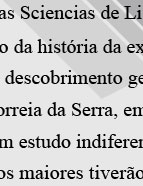

................................
The História dos descobrimentos, da expansão e da colonização portugueses [History of the Portuguese discoveries, expansion and colonisation] seemed inevitably bound up with the practice of international politics as it was being defined and responded to by the powers that be.
This subject was also addressed in school textbooks - as can be seen in the book published by Pinheiro Chagas in 1895. However, a global and articulated vision that would define the content and demand the autonomy of the History of the Discoveries and Portuguese Expansion was still lacking. It was therefore necessary for writers intending to study a given figure or event to present long introductions to the history of the Discoveries. This was the approach adopted in 1882 by J. M. Latino Coelho in his Vasco da Gama (1985), in 1894 by Fortunato de Almeida on Prince Henry the Navigator (1894) and Faustino da Fonseca on the discovery of Brazil by Pedro Alvares Cabral in 1900 (1908). A more general attempt, although not so successful, was made by Emiliano Augusto de Bettencourt in Descobrimentos, guerras e conquistas dos portugueses em terras do ultramar nos séculos XV e XVI [Discoveries, wars and conquests of the Portuguese in overseas lands in the 15th and 16th centuries]. Latino Coelho relied mainly on works on the history of geographical knowledge. He managed to skilfully frame Vasco da Gama's voyage within a network of information on geographical knowledge from ancient times to the period when the Portuguese began their navigations. This is what structured the entire work and lent it an unequivocal broad meaning. In the meantime, Richard Henry Major, an Englishman, had already published his biography of Prince Henry the Navigator (1868), which was translated into Portuguese a few years later (1876). They would all drink from this cup.
But on another centenary with far less festive exuberance, namely that of Prince Henry the Navigator in 1894, the first work attempting to present a synthesis of the Discoveries emerged: this work was authored by Fortunato de Almeida, a geography and history teacher at the Liceu de Coimbra [Coimbra High School]. His aim was to frame the entire work (and historical figure) of Prince Henry the Navigator, to the point of extending the scope of his work from the discovery of the African coast to the voyage of Fernão de Magalhães (the discovery of America, the sea route to India and Brazil). These were interpreted as " a result of the work of Prince Henry the Navigator".
